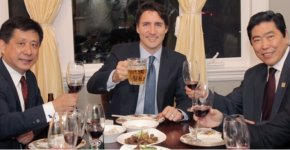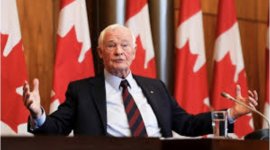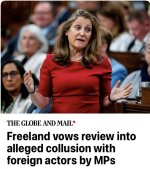The Liberal government is facing pushback from Justice Marie-Josée Hogue for citing cabinet confidentiality in redacting records provided to the public inquiry investigating meddling by China and other hostile states in Canadian democracy.
The government is also completely withholding an undisclosed number of cabinet documents, according to the Privy Council Office (PCO), which reports directly to Prime Minister
Justin Trudeau.
Public Safety Minister Dominic LeBlanc had initially promised that the Commission into Foreign Interference would have full access to secret documents, including “all relevant cabinet documents” even if some of that sensitive information can’t be made available to Canadians.
But a dispute has arisen after the government invoked cabinet confidence to redact some cabinet records and to deny the Hogue inquiry access to an unknown number of documents involving
foreign interference.
Buried in a footnote in Justice Hogue’s May 3 report, she said there were redactions in some of the cabinet documents handed over to the inquiry and added “discussions as to the applications of these privileges is ongoing.”
Michael Tansey, senior communication adviser to the commission, said Wednesday that Justice Hogue had no further comment.
Public Safety Minister Dominic LeBlanc initially promised the commission would have full access to secret records

apple.news
“In light of the ongoing discussions with the government on document production, the commission has nothing to add at this time,” he said.
The PCO told The Globe and Mail that nearly 10 per cent of cabinet documents provided to the inquiry have been redacted. An undisclosed number of other secret cabinet documents have been completely withheld.
Pierre-Alain Bujold, manager of media relations at the PCO, did not say how many cabinet documents have been held back. But he said the commission has been given access to “relevant information” about what the cabinet knew concerning foreign interference in the 2019 and 2021 elections.
“As of May 17, 2024, approximately 9% of the 33,000 documents provided by the government contain one or more redactions. Other documents covered entirely by these exemptions have not been provided to the commission,” Mr. Bujold said in an e-mail to The Globe, which requested information on what documents have been withheld.
“Discussions about document collection, production and appropriate disclosure have been, and remain ongoing,” he said.
Dan Stanton, a former manager at the Canadian Security Intelligence Service and now director of the national-security program at the University of Ottawa’s Professional Development Institute, said Justice Hogue has the security clearance to see every item of classified intelligence including cabinet records.
“If things are withheld from the commissioner, then that calls into question the effectiveness of the inquiry,” he said. “The commissioner should be seeing everything, regardless of what is disclosed to the public. Otherwise, how can it be assessed?”
Mr. Bujold said the inquiry has broad access to classified and unclassified documents but information subject to solicitor-client privilege or information that is a cabinet confidence have been withheld.
View attachment 22204
Asked to explain the reasoning behind the move, Mr. Bujold said, “Cabinet confidentiality is a cornerstone of the Westminster system of government that is protected by convention, common law, and legislative provisions. It is critical to allowing cabinet to carry out its mandate effectively.”
View attachment 22205
Section 39 of the Canada Evidence Act safeguards cabinet confidentiality, a long-standing principle, upheld by the courts, to protect collective decision-making by ministers.
The confidentiality exceptions are cabinet documents that the government authorized for disclosure to the National Security and Intelligence Committee of Parliamentarians and the National Security and Intelligence Review Agency. This followed a recommendation from former governor-general David Johnston before he resigned as independent special rapporteur on foreign interference.
View attachment 22206
Justice Hogue resumes public hearings in the fall and will submit a second and final report on recommendations to combat foreign interference at the end of December.
In her first report, on May 3, Justice Hogue concluded that foreign interference in 2019 and 2021 undermined the right of Canadian voters to have an electoral process “free from coercion or covert influence” and may have affected results in a small number of ridings.
While foreign meddling did not alter the overall outcome of the two elections, she issued a call to action for the government to vigorously enact measures to tackle this “malign” threat to Canadian democracy.
She identified China as the “most persistent and sophisticated
foreign-interference threat to Canada” at the moment.







